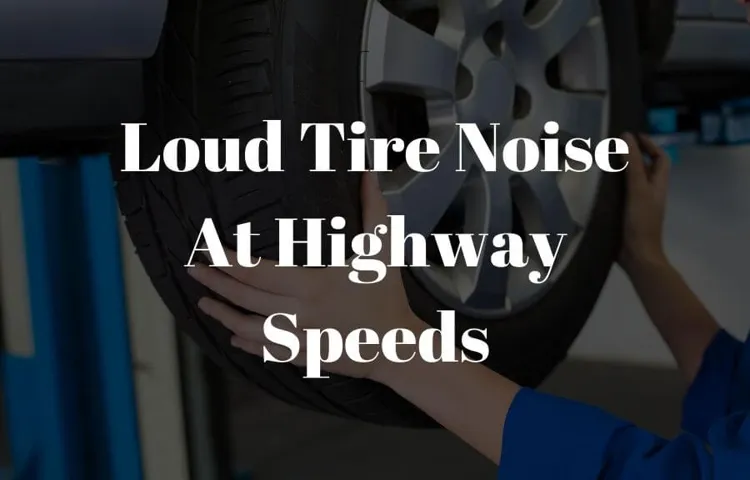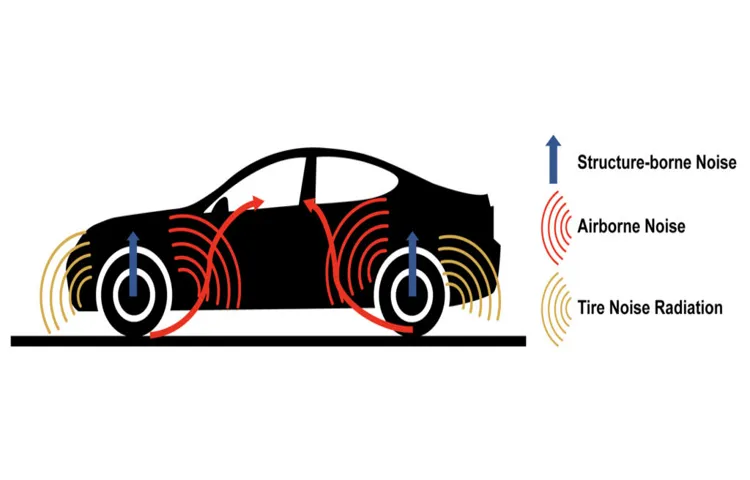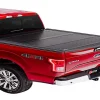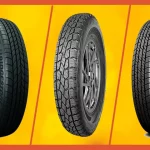Have you ever noticed a strange noise coming from your car’s tires while driving? If so, you’re not alone. Loud tire noise can be a frustrating issue, especially when you don’t know what’s causing it. While many factors can contribute to tire noise, some common causes include tire wear and tear, improper inflation, alignment issues, and road conditions.
As tires age, the treads wear down, which can cause vibrations and noise when driving. If your tires are not properly inflated, this could also lead to noise as the tires have to work harder to maintain contact with the road. Alignment issues, such as uneven wear or a misaligned suspension system, could also cause your tires to make more noise than usual.
And if you’re driving on rough or uneven surfaces, this could contribute to tire noise as well. It’s important to address tire noise sooner rather than later, as it could indicate a larger issue that needs to be addressed. In this blog, we’ll explore what causes loud tire noise and how to fix it.
We’ll also provide tips on how to prevent tire noise from occurring in the first place.
Table of Contents
Introduction
Do your tires sound like a jet engine when you’re driving, making it almost impossible to enjoy your music or hold a conversation? Loud tire noise is a common issue, and there are several reasons why it may occur. One possible cause is uneven tire wear due to alignment or suspension issues, which can create a humming or thumping noise. Another common culprit is low tire pressure or improper inflation, leading to a buzzing or roaring sound.
Additionally, the tire tread design can also influence noise levels, with some tire patterns generating more noise than others. It’s essential to address this issue promptly, as it could indicate a safety concern and lead to more significant problems down the road. Regular tire maintenance and inspection can prevent such issues and ensure a smooth, comfortable ride, free from noise and distractions.
Explanation of Tire Noise
Tire noise can be a confusing and frustrating issue for drivers. It occurs when the tire treads come into contact with the road surface, and can vary in volume and pitch depending on the type of tire and the road conditions. One of the main causes of tire noise is the tread pattern, which can create a humming, whirring, or rumbling sound as the tires rotate.
Other factors that can contribute to tire noise include tire size, inflation pressure, and the condition of the road surface. However, there are ways to reduce tire noise, such as choosing tires with a quieter tread pattern and maintaining proper inflation levels. By taking steps to minimize tire noise, drivers can enjoy a quieter and more comfortable ride.

Types of Loud Tire Noise
Loud tire noise can be a disturbing and sometimes alarming issue for many drivers. There are various types of sounds that can come from your tires, and each could indicate a problem with your vehicle. Among the different kinds of tire noise are rumbling, thumping, and screeching.
Rumbling noise is often a sign of a worn-out tread or uneven weight distribution. Thumping noises could indicate a problem with your wheel bearings, while screeching noises are commonly due to problems with your brakes or a lack of tire traction. It’s essential to identify the source of the noise and take action accordingly to prevent any further damage to your tires and car.
Common Reasons for Loud Tire Noise
Tire noise can be quite frustrating and annoying for drivers, especially when it is loud and persistent. The reason for noisy tires can vary from one car make and model to another, but some common factors can contribute to this issue. Certain types of tires are more prone to producing loud tire noise than others, such as mud terrain tires or off-road tires.
Other common reasons for tire noise include wearing of the tires, poor alignment, low tire pressure, and damaged or worn-out wheel bearings. These factors can cause the tires to become unbalanced, leading to an increase in noise. Regular tire maintenance and inspection can help identify and resolve any issues that may be causing loud tire noise.
By keeping your tires in good condition, you can ensure a smooth and quiet ride, which is essential for a comfortable driving experience.
How to Diagnose Loud Tire Noise
If there’s one thing that can quickly ruin your driving experience, it’s tire noise. Whether it’s a loud humming or an annoying whine, it can make your vehicle sound like a jet engine or a whining child. One of the most common causes of loud tire noise is worn or unevenly worn tire treads.
As your tires wear, they can develop flat spots, which create a constant low-frequency thumping sound. Other causes of loud tire noise include improper wheel alignment, worn suspension components, or damaged bearings. It’s important to diagnose the cause of the tire noise as soon as possible, as continued driving on worn or damaged tires can put you at risk of a blowout or other dangerous driving situations.
If you notice a loud tire noise while driving, take your vehicle to a trusted mechanic to have it inspected and repaired, for your safety and peace of mind.
Inspection of Tires
As a driver, it’s not uncommon to experience loud tire noise while driving. This type of noise can be caused by several factors, but the most common culprit is worn or damaged tires. To diagnose the issue, start by performing a visual inspection of your tires.
Look for any signs of wear and tear such as cracks or bulges on the sidewalls or uneven wear on the treads. Uneven wear is often an indication of an alignment issue or improper tire pressure. If your tires appear to be in good condition, the next step is to check the tire pressure.
Low tire pressure can cause increased friction, which leads to louder road noise. Lastly, consider the age of your tires. Tires that are more than 5-6 years old may start to lose their grip and become noisier.
If you are still experiencing loud tire noise after checking these factors, it may be time to bring your vehicle to a professional for a closer inspection. Don’t ignore loud tire noise as it can indicate a serious safety issue. By identifying the problem early on, you can prevent costly repairs and keep yourself safe on the road.
Road Test
When you’re on the road and you start hearing a loud noise coming from your tires, it’s essential to know what could be happening. Loud tire noise can be a sign of wear and tear, but it can also indicate a larger issue with your vehicle. To diagnose the issue, start by paying attention to the type of noise you’re hearing.
Is it a rumble, a whine, or a screech? Any of these could mean different things. Additionally, pay attention to when the noise happens. Is it when your car is stationary, or when you’re turning, accelerating, or braking? All of these details can help you pinpoint the issue with your tires and get them fixed before they become a bigger problem.
Remember, regular maintenance and attention to your vehicle can go a long way in keeping you safe on the road.
Visual Inspection of Wheel Components
Loud Tire Noise Has your car been making loud tire noise lately? It’s not only annoying, but it could also be a sign of a serious problem. To diagnose the issue, first, inspect the wheel components visually. Look for any signs of wear and tear on the tires, such as bald spots, uneven wear patterns, or cracks.
Check the tread depth to ensure it meets the recommended standards. Also, inspect the rims for any cracks or bends. These problems can cause loud tire noise, and if not addressed promptly, could lead to a blowout or other serious safety risks.
This visual inspection is essential for pinpointing the problem and preventing further damage. So, if you’re experiencing loud tire noise, inspect your wheel components immediately and seek the help of a professional if necessary.
How to Prevent Loud Tire Noise
If you’ve ever been on a road trip and experienced loud tire noise, you know how annoying and distracting it can be. Tire noise can be caused by a variety of factors, including the type of tire you’re using, the condition of your tires, and the road surface you’re driving on. One way to prevent loud tire noise is to invest in high-quality, low-noise tires.
These tires are designed specifically to minimize noise while still providing excellent performance on the road. Additionally, it’s important to maintain your tires properly, which includes regular rotations, balancing, and checking for wear and tear. Poorly maintained tires can cause excessive noise and even lead to dangerous driving conditions.
Finally, consider the road surface you’re driving on and adjust your speed accordingly. Certain surfaces, such as concrete or grooved pavement, can be especially noisy for tires. By being proactive and taking steps to prevent tire noise, you can enjoy a quieter and safer driving experience.
Proper Tire Maintenance
Proper Tire Maintenance is crucial for the longevity and safety of your vehicle. One common issue that drivers encounter is loud tire noise. This can be caused by several factors, including uneven wear, under or over-inflation, and misalignment.
To prevent loud tire noise, it’s important to regularly check your tires for these issues and address them as soon as possible. Keeping a tire pressure gauge in your vehicle and checking your tire pressure once a month is a good habit to develop. Additionally, rotating your tires regularly can help ensure even wear and prevent excessive noise.
Remember, neglecting proper tire maintenance can lead to not only loud tire noise but also reduced gas mileage, poor handling, and even dangerous blowouts on the road. Don’t let your tires be the reason for an accident – take the time to maintain them properly so you can drive safely.
Alignment and Balancing
Preventing Loud Tire Noise through Alignment and Balancing Are you experiencing loud tire noise while driving? This is a common issue that can occur due to misaligned or unbalanced tires. One way to prevent this noise is through proper alignment of the tires. Wheel alignment adjusts the angles of the wheels to meet manufacturer specifications.
This ensures that the tires make proper contact with the road, reducing uneven tread wear and preventing noise. Additionally, balancing the tires distributes weight evenly, reducing vibrations and further preventing noise. It’s important to have your tires aligned and balanced regularly to ensure that they are running smoothly and quietly.
By taking these simple measures, you can enjoy a quieter, smoother ride and avoid the annoyance of loud tire noise.
Conclusion
In summary, the science behind loud tire noise can be complex and multifaceted. Factors such as tread pattern, tire pressure, road surface, and vehicle speed all play a role in the decibel level heard on the road. But let’s be real – sometimes, a little bit of noise just adds to the thrill of the ride.
So, whether you’re cruising down the highway or burning rubber on the track, embrace the roar of the rubber and enjoy the ride!”
FAQs
What are the common causes of loud tire noise?
There are several factors that can cause loud tire noise, including uneven tire wear, damaged wheel bearings, and misaligned wheels.
How can I tell if my tires are causing loud noise?
If you hear a loud humming or vibrating noise from your tires, it could be a sign of a tire problem. You should have your tires inspected by a professional mechanic.
Can tire pressure affect the noise level of my tires?
Yes, improper tire pressure can cause your tires to wear unevenly, leading to increased noise while driving. Make sure to regularly check your tire pressure and keep it at the recommended level.
What should I do if I hear loud tire noise while driving?
If you hear loud tire noise while driving, it is important to take your vehicle to a mechanic as soon as possible. Ignoring the problem could lead to further damage and potentially dangerous driving conditions.
Can loud tire noise affect the performance of my vehicle?
Yes, loud tire noise can be a sign of underlying problems that could affect the performance and safety of your vehicle. It is important to have any tire-related issues addressed promptly.
How much does it cost to fix tire noise issues?
The cost of fixing tire noise issues can vary depending on the cause of the problem. It is best to get a quote from a professional mechanic to determine the exact cost.
Can regular tire maintenance prevent loud tire noise?
Yes, regular tire maintenance such as proper tire pressure, rotation, and alignment can help prevent uneven tire wear and loud tire noise. It is important to follow the recommended tire maintenance schedule for your vehicle.



